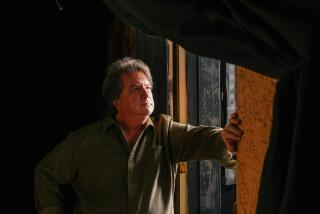Playwright Lanford Wilson is celebrated in his home state of Missouri
Over a warm spring weekend, a group of academics, Midwestern students and New Yorkers gathered here to talk about a groundbreaking Missouri playwright who took the small-town themes of his troubled, gay youth and turned them into powerful onstage depictions of characters striving against the status quo.
Theater buffs would immediately guess Tennessee Williams. But they would be wrong. The playwright these theater artists and academics were gathered to discuss was the other troubled, gay Missouri playwright who leveraged his early difficulties into powerful stage depictions: Lanford Wilson.
Wilson and Williams shared not only the experience of growing up in Missouri but also a professional collaboration and a friendship. They connected early in Wilson’s career for a project that took them on a road trip through the American South.
Williams was born in Mississippi and moved to St. Louis when he was a young boy. He bombed out of ROTC at the University of Missouri, where he wrote his first known play and short story and tried to study journalism before his father pulled him out of school and put him to work at a shoe factory in St. Louis.
Wilson was born in Lebanon, Mo., and as soon as he was able to get away, he escaped to first San Diego and then Chicago before landing in New York City. There he cofounded the groundbreaking Circle Repertory Company and helped drive the off-Broadway scene that championed the work of new American plays.
“Both Tennessee and Lanford wrote a lot about outsiders,” says theater director Marshall Mason, who closely worked closely with Wilson for 42 years, staging his plays at Circle Rep from the 1970s into the 1990s.
The director also worked with Williams, and he sees strong similarities as well as distinct differences between the two. Both playwrights channeled the pain of their heartland youth into settings of marginalization, violence and despair, and both created memorable characters struggling against these forces.
But Wilson, Mason said, “wrote more eloquently about America than any playwright of his generation. I don’t think Tennessee did that, you see. He didn’t write about America. He didn’t get at the fabric of America, which is what Lanford really got at.”
Wilson is best known for his trilogy of plays depicting the Talley family. It includes “Fifth of July,” set at a Missouri farmhouse, for which Swoosie Kurtz won a Tony in 1981, and “Talley’s Folly,” which earned Wilson the 1980 Pulitzer Prize for drama. Jeff Daniels and William Hurt also originated roles in Wilson’s first productions with Circle Rep. Meanwhile, Wilson’s “Burn This,” which starred John Malkovich in the original 1987 Circle Rep production at L.A.’s Mark Taper Forum, is scheduled for a 2018-19 Broadway season revival starring Adam Driver.
Wilson conference
Mason and former Circle Rep artists, academics and students were gathered in Columbia for a conference on “Missouri Self-Taught: Lanford Wilson and the American Drama” in a place from which the playwright couldn’t escape fast enough.
“It’s more than he hated it and he left,” said Henry Schvey, a drama professor at Washington University in St. Louis. “He hated it, but he needed it.”
The same was true of Williams. Speaking of the famed playwright’s St. Louis, Schvey said, “He carried it — like Joyce carried Dublin — with him.”
Schvey added that because both playwrights tapped into the bleakness of their Missouri experiences, celebratory conversations and gatherings like this are still somewhat rare in the state.
“We don’t talk about Williams in St. Louis,” he said, wryly. “He’s like the rude guest who left early and didn’t enjoy the meal.” Nevertheless, the third edition of a festival honoring Williams is playing out in the theater community in St. Louis through May 19. But Schvey added that the event was much smaller than the “Tennessee Williams/New Orleans Literary Festival,” for instance, now in its 32nd year.
Wilson’s fans at the University of Missouri conference pointed out that no matter where the two writers set their plays, they loved their marginalized, struggling characters striving to find their place in often suffocating surroundings. Think of “A Streetcar Named Desire’s” Stanley. Schvey said Williams based that character and his imploding frustrations on an experience in that St. Louis factory.
During a lunch break at the conference, actress Tanya Berezin and playwright Mary Sue Price talked about their long and fruitful relationship with Wilson.
Berezin cofounded Circle Repertory Company with Wilson and Mason in 1969, and the playwright created several roles for her. She described herself as a “Jewish girl from Philly” who had always found resonance in the people and places of Wilson’s world.
Berezin and Price found it both a pleasure and something of a shock to see their collaborations and friendships with Wilson, who died in 2011, become the subject of academic scrutiny. The two exchanged memories about Lanford — nearly everyone at the conference referred to Wilson by his first name — and the artists and community at Circle Rep.
ners cooked by Price, and play-reading weekends at
Both women kept coming back to not only the strength of Wilson’s character portrayals but also to a belief that his voices — the unheard, marginalized voices that go against the status quo — are more important to be heard now than ever.
Price, a Missourian herself, creates work about rural and small-town places and people. She called the heartland “a really scary place.”
“It’s still a scary place,” she said. “And it needs to be written about. And not made fun of.”
Wilson wrote about other places and people too. He dramatized dancers, artists, prostitutes and down-and-outs living on the margins of New York City. But whether the setting is a Missouri farmhouse in “Fifth of July,” the rundown hotel of “The Hot L Baltimore” or the New York City loft in “Burn This,” his characters are “multi-dimensional” and “striving” — words used repeatedly at the Missouri conference.
“Lanford wrote characters that were so rich and wonderful,” said Mason. “You have to go all the way to Chekhov to find another writer who wrote such rich characters.”
University of Missouri theater professor David Crespy said the themes these playwrights tackled haven’t changed. For a recent production in Columbia of Wilson’s “The Rimers of Eldritch,” a play that depicts family and community violence and its after-effects in a small town, Crespy cast a diverse ensemble that included Latino, Bosnian and black students. He said this new generation of students, many of them young, diverse Missourians, share experiences like Wilson’s.
“This place,” added Crespy, gesturing to the stage set and its re-creation of Wilson’s Eldritch, “speaks to these kids. … A lot of these kids grew up in rural places in Missouri. Those sensibilities, those whisperings, those secrets that small towns keep are still very much there.”
Crespy named such contemporary playwrights as Lisa Loomer, Sheila Callaghan and Lynn Nottage, with her Pulitzer-winning “Sweat,” as artists mining the voices and struggles of small-town Americans in their work.
“I think small-town America is very much on the mind of playwrights who are looking at this phenomenon of people voting from this lack of opportunity, this place where all the jobs have gone away,” he noted. “People are going, ‘How in the hell did Trump get elected?’”
The answer might be in the multiple dimensions of the people who can best be portrayed and encountered through art. This was a common theme emerging from those at the conference.
“They’re still displayed as fully realized, complicated human beings, who are not deplorables,” Crespy said. “They’re people who are struggling through very tough times, who make wrong choices and do very hurtful things. But they’re trying to make the best of what they’ve been given.”
.
Sitting near his quiet Eldritch set — a scene with front porches and a church pulpit — Crespy said the reason to pay attention to Wilson’s characters is because they aren’t just voices inhabiting “other” towns. Eldritch is “a mythical everytown,” Crespy said.
Mason echoed that idea in another way. “I don’t consider Lanford a Midwestern playwright,” he said. “I consider him an American playwright.”
Asked what he hoped new audiences might take away from the planned Broadway revival of “Burn This” next season, Mason said: “His great love of humanity is the primary thing.”
More to Read
Only good movies
Get the Indie Focus newsletter, Mark Olsen's weekly guide to the world of cinema.
You may occasionally receive promotional content from the Los Angeles Times.






